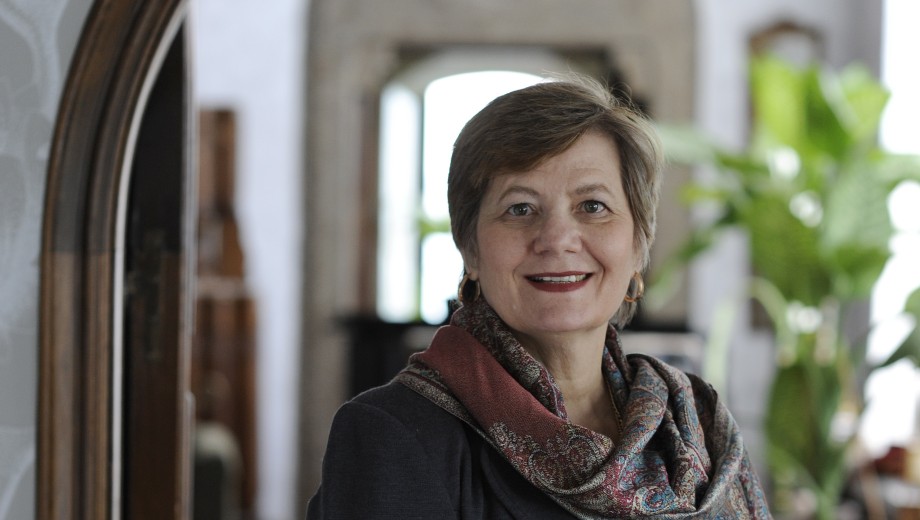“The division is something that I feel deeply invested in—personally as well as intellectually,” says Martha T. Roth, dean of the Division of the Humanities and the Chauncey S. Boucher Distinguished Service Professor of Assyriology.
In July, Roth began her second five-year term as dean, reappointed by President Robert J. Zimmer and Provost Thomas F. Rosenbaum.
The first five years
At a time when many institutions have scaled back investment in the humanities, the division has grown and thrived. Since 2007, the size of its faculty has increased by 12 percent—from 186 to 208 faculty members. New endowed professorships were added in English literature and American culture and two new University Professors—Augusta Read Thomas and Haun Saussy, pictured below—joined the faculty. Five promising young scholars were recruited to the University as Neubauer Family Assistant Professors.
During Roth’s first term, the Chicago Center for Jewish Studies was launched and the Logan Center for the Arts and Mansueto Library opened their doors. New initiatives such as the University’s Center in Beijing, the Neubauer Family Collegium for Culture and Society, and the Indian Ministry of Culture Vivekananda Visiting Professorship have all contributed to raising the University’s and the division’s global profile and provided vital resources for collaboration and dialogue.
All incoming PhD students in the division now receive five years of fellowship funding, thanks to the Graduate Aid Initiative. In her previous role as deputy provost, Roth was charged by President Zimmer to lead the team that shaped the program, helping the University to attract and support top doctoral candidates in the humanities and social sciences.
“Every department is at least as strong or stronger than it was five years ago, an accomplishment of which I’m extremely proud,” says Roth, who sought both to bolster core programs and encourage new interdisciplinary initiatives in her first term. “I’m also proud that we kept our ambitions strong, hiring and retaining faculty members even through the financial crisis.”
[wysiwyg_field contenteditable="false" wf_deltas="1" wf_field="field_article_images" wf_formatter="image" wf_settings-image_link="content" wf_settings-image_style="featured-img-landscape" wf_cache="1350671012" wf_entity_id="96" wf_entity_type="node"]
The next five years
Looking to the challenges facing the Division of the Humanities and her ambitions for its continued growth and vibrancy, Roth has outlined a set of goals for the next five years that will coincide with a major, University-wide fundraising campaign.
One of her top priorities is to continue making strategic hires while ensuring that current faculty members have the tools they need to succeed as scholars. “For many of us, those tools are quite tangible: studio space, laboratory space, library acquisitions,” she says. “For everyone, ongoing intellectual interactions are also essential, and this means finding support for lecture series, visitor programs, funds for research and travel to archives.”
Helping graduate students succeed is another priority. “Having all of our PhD students funded equitably and adequately has made a big difference in the morale of our students and faculty, and it’s much more productive to community interaction,” says Roth. But since most PhD programs can’t be completed in five years, the division needs to offer more fellowships for students in the dissertation phase.
Roth also would like to provide more financial aid for students in dedicated master’s programs: the Master of Arts Program in the Humanities, the MFA program in Visual Arts, and the master’s programs in Latin American and Middle Eastern Studies.
“Globally, the University of Chicago holds a respected and responsible position as a leader in humanistic inquiry,” says Roth. To help ensure the continued excellence and strategic expansion of research and teaching in the humanities, in May she announced the creation of two new deputy dean positions.
On July 1, Mario Santana (Romance Languages and Literatures) began a term as deputy dean for languages. More than 50 languages are taught in the division, reflecting what Roth calls a “mission-driven commitment” to language instruction as a means of acquiring knowledge about cultures. Santana will oversee language instruction and pedagogy in a way that defines and advances this mission, working with departments, centers, study-abroad programs, and the University’s global centers.
In July 2013, Bill Brown (English and Visual Arts) will begin an appointment as deputy dean for academic and research initiatives. In this role, he will work closely with faculty to develop and articulate innovative projects that advance humanistic inquiry, including the development of new graduate tracks and programs.
The study of the humanities at UChicago comprises a vast enterprise of complicated moving parts: 15 departments, 26 affiliate centers and institutes, four joint degree programs, four master’s programs, and eight academic journals. Citing the critical role that “administration and staff at every level, dedicated faculty, and outstanding students” have played in moving the division forward, Roth says, “It is truly an honor to serve as dean of the Division of the Humanities at the University of Chicago.”

